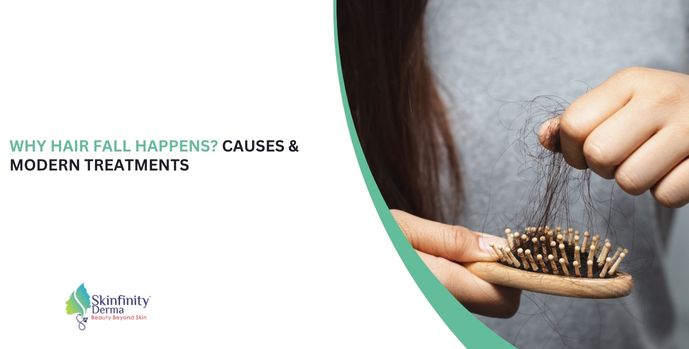Hair loss thinning is a common concern that affects both men and women, impacting confidence and self-image. While occasional shedding is normal, persistent hair loss may indicate underlying issues such as genetics, hormonal imbalances, nutritional deficiencies, or lifestyle factors. Understanding the root causes is crucial for selecting the right solution and preventing further thinning. Modern, FDA-approved treatments like Minoxidil and Finasteride provide scientifically-backed methods to slow hair loss, encourage signs of hair regrowth, and improve overall scalp health. Recognizing early warning signs and acting promptly ensures better long-term results and healthier hair.
Why Hair Fall Happens: Causes
Many people wonder, “Why is my hair falling out?” The reasons can vary between men and women:
Genetic Factors:
-
Male pattern baldness (androgenetic alopecia): Causes gradual thinning, receding hairlines, and bald spots on the crown.
-
Female pattern hair loss: Women often experience diffuse thinning, particularly along the parting, influenced by genetics and hormones.
Hormonal & Age-Related Factors:
Hormonal changes, thyroid disorders, and aging can weaken follicles, accelerating shedding.
Lifestyle & Environmental Factors:
Poor nutrition, stress, excessive heat styling, smoking, and certain medications contribute to hair loss thinning.
Identifying the reason for hair fall in male or the reason of hair fall in female helps target effective treatments, including FDA-approved options and lifestyle changes that support healthy hair.
Medical Conditions & Hormonal Factors
Hair loss is often linked to medical conditions and hormonal changes:
-
Thyroid Imbalance: Both hypo- and hyperthyroidism can disrupt follicle activity, causing thinning.
-
Anemia: Low iron reduces oxygen supply to follicles, leading to shedding.
PCOS (Polycystic Ovary Syndrome): Hormonal fluctuations in women can trigger hair thinning. -
Stress-Related Hair Loss: Chronic stress can cause telogen effluvium, a temporary shedding condition. Hormonal shifts during pregnancy, menopause, or puberty may also contribute.
Addressing underlying medical conditions alongside FDA-approved treatments like Minoxidil enhances regrowth and strengthens hair over time.
Nutritional Deficiencies & Lifestyle Factors
Diet and lifestyle play a crucial role in how to prevent hair fall:
Key Nutrients for Hair Health:
-
Protein: Builds keratin, essential for hair structure.
-
Iron: Supports follicle strength; deficiency leads to shedding.
-
Zinc: Promotes growth and repair.
-
Vitamin D: Deficiency can disrupt the hair growth cycle.
Lifestyle Habits:
-
Manage stress through exercise, meditation, and adequate sleep.
-
Avoid excessive heat styling, harsh chemicals, and tight hairstyles.
Combining proper nutrition with evidence-based treatments helps reduce shedding, maintain existing hair, and stimulate signs of hair regrowth.
How to Stop Hair Fall Immediately
For those asking how to stop hair fall immediately, integrating treatments with lifestyle changes is key:
Topical Treatments:
-
Minoxidil: An FDA-approved topical solution that strengthens follicles and slows shedding.
Lifestyle Adjustments:
-
Balanced diet with protein, iron, zinc, and vitamins.
-
Stress reduction through meditation, yoga, or exercise.
-
Gentle hair care and avoiding harsh styling practices.
-
Adequate sleep and hydration.
Consistency is vital. Consulting a board-certified dermatologist ensures the most effective, safe approach to achieving fuller, healthier hair.
Modern Treatments for Hair Loss
Several scientifically-backed treatments can address hair loss thinning effectively:
-
Minoxidil (Topical): Stimulates follicles; suitable for men and women; visible results in 3–6 months.
-
Finasteride (Oral, Men Only): Reduces DHT; slows male pattern baldness progression.
-
PRP Therapy: Uses platelet-rich plasma injections to improve follicle strength and density.
-
Low-Level Laser Therapy (LLLT): Stimulates cellular activity to promote thicker, healthier hair.
-
Hair Transplant: Relocates hair from donor sites to thinning areas; provides permanent results for stable hair loss.
Combining lifestyle adjustments with FDA-approved treatments maximizes effectiveness. Professional guidance ensures the right choice for your hair loss stage.
Preventive Measures & Daily Hair Care
How to prevent hair fall involves consistent habits:
-
Hair Care: Gentle shampoo, avoid heat and chemicals, regular scalp massage.
-
Stress Management: Meditation, yoga, adequate sleep.
-
Nutrition: Protein-rich foods, iron, zinc, vitamins D and B-complex, hydration.
These measures complement treatments like Minoxidil, Finasteride, or PRP, slowing thinning and maintaining long-term hair health.
Conclusion
Understanding hair loss and the causes of hair thinning and loss is the first step toward healthy hair. Early detection, combined with FDA-approved treatments and lifestyle improvements, significantly increases the chances of preserving hair. Consulting a dermatologist ensures a personalized plan for optimal results. Begin preventive care today to reduce shedding, strengthen follicles, and support lasting hair growth.

